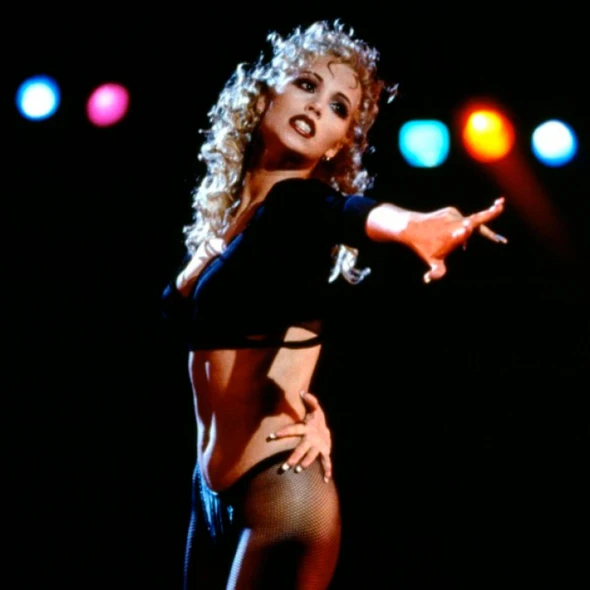
Nobody plays neurotic like John Early. Since breaking out as the compulsive liar Elliott Goss on Max's dark comedy series Search Party, the actor and comedian has perfected a certain on-screen persona: Often queer, always anxious, with enough neuroses to kill a small Victorian child.
"It's always right there ready to go!" Early says with a laugh. "When I wake up in the morning, it is right on the surface, and I just have to go, 'boop,' and it's on. That's always been available to me, comedically."
Early credits the character to his "front-facing, Presbyterian, keep-everyone-happy" upbringing in Nashville, Tennessee, where he grew up the son of two ministers. "That is the blessing and curse of being me on a film set," he explains. "It's one of my strengths as a producer, but it's also a curse in that it's totally exhausting. So, I do have to go home from shoots and just bonk myself on the head with a mallet."
After memorable appearances in movies like Other People (2016) and Beatriz at Dinner (2017), Early gets his first proper leading role in Stress Positions, a screwball comedy in which he stars as Terry Goon, a hapless, self-obsessed millennial experiencing his own personal crisis amid Covid lockdowns. Early is also a producer on the film, which marks the feature directorial debut of his friend and longtime collaborator Theda Hammel.
"She can detect the deeper critique that's underneath my silliness," the actor muses. "I will be clowning, making faces, and she is able to elevate and contextualize what I am doing and tease out the smarter stuff that's latent in there, that I can't express on my own because I'm a fool."
Below, Early shares with A.frame the five films that made him the performer he is today. "All the movies that I've chosen were movies that, when I watched them, I felt rearranged. I felt like my life had been irrevocably changed."
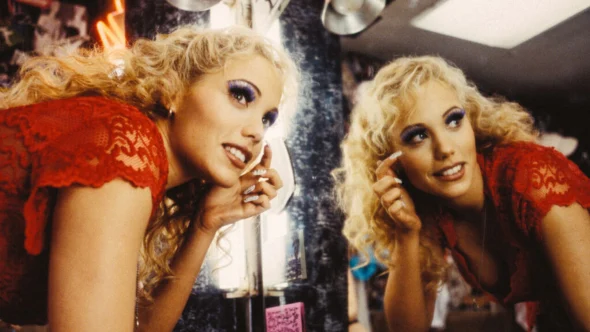
Directed by: Paul Verhoeven | Written by: Joe Eszterhas
I've seen Showgirls so many times. I've been to many screenings of it. Famously, I recreated one of the scenes in, like, 2012. Showgirls really exploded something for me. It had all the things that I think gay guys love — dancing, rivalry, an expressionistic quality of acting — but it was made by a male auteur with real extreme confidence and with such a crazy taste level. All the designers on that movie are working at such a crazy level. It's such a beautiful merging of high and low. It's so unhinged, emotionally and sexually, and it's so expressed, but it's all happening in this incredibly refined package. It really shocked me.
I was laughing so hard, and yet I was also so moved. It's so full of feeling. It has an expressiveness that we seem to have routinely beat out of contemporary performance, contemporary music, contemporary acting, contemporary filmmaking. It's got such a verve. I just love it so much. When I'm thinking of making my own work, I always start there. It's so special to me.
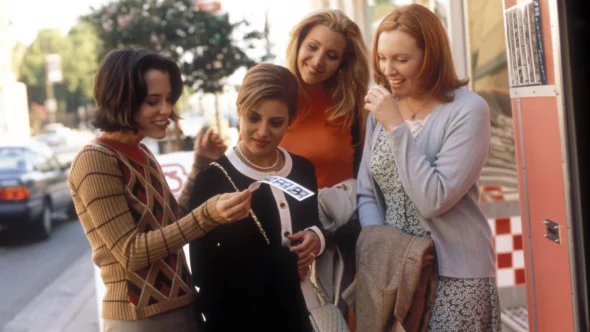
Directed by: Jill Sprecher | Written by: Jill Sprecher and Karen Sprecher
Clockwatchers was the first real mature movie I watched. I found it in Blockbuster when I was 11 years old, because I was really drawn to Lisa Kudrow. I was really, really rocked by her in Romy and Michele's High School Reunion, and also Parker Posey from the Christopher Guest movies, and Alanna Ubach from The Brady Bunch Movie. But Lisa Kudrow was my way in, and I couldn't believe that someone as funny as her was capable of such bone-chilling sadness, too.
It's also where I first came across Toni Collette, and I became absolutely obsessed with her. Then I watched Muriel's Wedding, and I named my dog Muriel. I made a website for her, and I devoted the next three years of my life to Toni Collette, basically, until I realized that I was making it so clear to the outside world that I was gay and I had to stop. But it's always continued on in me, obviously, and Clockwatchers was the beginning. I am very haunted by that movie. It is very small, but it's very existentially big and unsettling, and it really broke my heart. As a kid who was really just watching I Love Lucy and SNL, I think it introduced an existential quality of filmmaking to me. I was like, "Whoa." Clockwatchers is the thing that made me want to make movies.
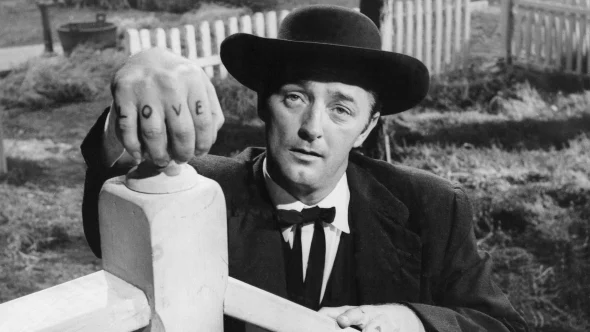
Directed by: Charles Laughton | Written by: James Agee
My parents were ministers — they're both ordained Presbyterian and Disciples of Christ ministers — and I'm very lucky that they're not Robert Mitchum [in The Night of the Hunter]. I was very lucky to have a really good childhood. They're not wolves in sheep's clothing. They're the real deal. They come at their faith from a very theological, very progressive angle. But as a kid, the thing that really drew me to religion was the music. There was something very spooky to me about the hymns we were singing.
My dad and mom loved this movie, and for that reason, of course, I never watched it. I finally watched it in my 20s, and I don't believe in the polarities of good and evil in real life, but I think that good and evil should be in movies. It should be in stories, and I think that's something that people have forgotten in filmmaking. I think there's a fear of being cringe or something, but I think The Night of the Hunter is such a perfect example of the evil, scary, evangelical preacher and then the pure children. And that polarity creates such a beautiful movie. I just love movies that feel like fairy tales, that feel spooky, that pull you through in that way.
I cry so hard every time I see that movie and John gives Lillian Gish the apple at the end, and she pretends it's the greatest Christmas present one could ever receive. It's just so beautiful. And it's wild! I can't believe it's Charles Laughton's only movie, but I think it's because it's his first and only movie that it has such a formal inventiveness. He was figuring it out in real time and making big gestural decisions that I think a more experienced filmmaker would be almost too embarrassed to do.
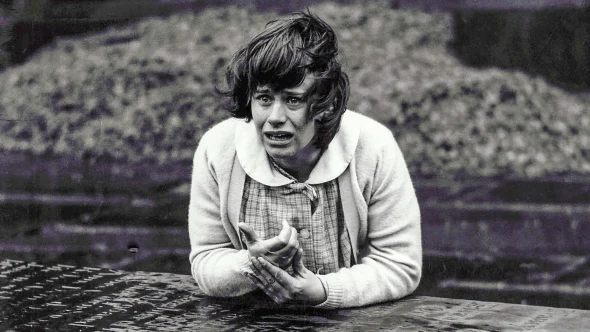
Directed by: Tony Richardson | Written by: Shelagh Delaney and Tony Richardson
A Taste of Honey is a film I saw during Covid. I had negative connotations of it, because if you go to acting school, sadly, for women, there are very few two-women scenes. And acting school is usually mostly women and a few gay guys and one straight guy, so I saw scenes from this movie with American college students doing really bad working-class British accents. I was always like, "Oh, no..." I never understood what was going on in those scenes. But then someone was like, "John, you have to see this." And I started it and the first scene is Rita Tushingham playing dodgeball in PE at her girl's school. And I just was like, "Oh my God."
A lot of my favorite movies are when I realized that this thing that I worship in movies, that I assumed was a contemporary thing or at least a '90s and on thing has preexisted. It was like seeing Welcome to the Dollhouse, but in the '60s, in the UK, and in black and white. It's very Dawn Davenport in Female Trouble to me, very Dawn Wiener in Welcome to the Dollhouse, very Laura Dern in Citizen Ruth. And I don't think there's ever been a gay guy-straight girl relationship that has ever even come close to the two characters in A Taste of Honey. No one has touched that level of tenderness and realism and love. That dynamic is always portrayed in this very flat, caustic way, but my friendships with women are not flat or mean. They're so important to me, and it's really rare that you see that portrayed with as much love. So, that was very profound.
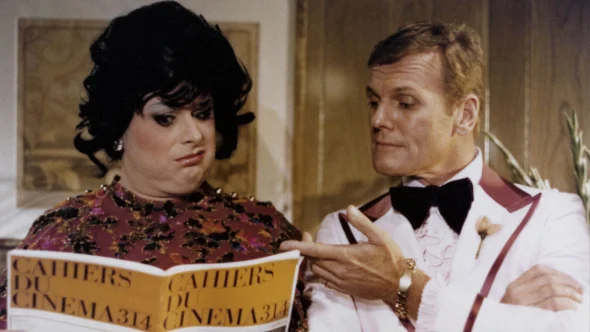
Written and Directed by: John Waters
I was really late to John Waters. I didn't watch him in high school when I should have been. I think he would've saved my life. I'd seen Hairspray as a kid, and I do remember it being like, "Something crazy is going on here, and I need to flag this." But when I finished Polyester for the first time, alone in my apartment in Brooklyn, I wept inconsolably. It is not a sad ending, but I didn't know that boys could play girls. I knew that you could do that in a sketch comedy sense, but I didn't know you could do that in a Divine way, where the gender is inconsequential. It's not about Divine being a boy. It's about Divine being a star. And there's something so beautiful about the way John Waters is creating a world for his friend to be Elizabeth Taylor, or Jane Wyman. In this case, Jane Wyman. Of course it's so funny, but there's something about it all, and about all of his movies, that is very tender underneath that I feel like doesn't get talked about as much.
Polyester was the first time I was like, "Oh, no, this is actually what I want to do." I always wanted to play women, but the only version of that that I saw was in sketch comedy. But I always had this murky instinct of, "I want to do a full feature and make it real." Like, "I want to do that movie Thirteen, but it's me." And then I saw Polyester and I was like, "It's been done, and it's been done so beautifully."

